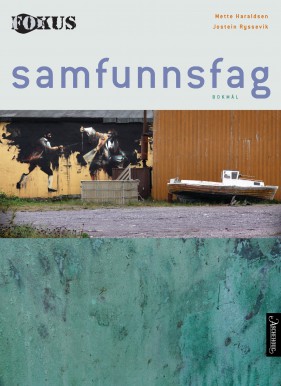Social studies textbooks used in Norwegian schools are not politically neutral, according to members of Norway’s youth political parties. The textbook authors, and their publishers, are accused of having a left-wing bias.

Social studies is one of the central subjects in upper secondary school (videregående) in Norway, and it should, according to the National Curriculum (Læreplanen) “give pupils greater skills in thinking freely, critically, tolerantly and from different perspectives.”
Critics, however, argue that social studies textbooks present a “lopsided” view of politics, as reported by newspaper Aftenposten.
The debate flared up again recently after a journal article claimed that the widely used textbook “Fokus” was clearly influenced by its author’s political leanings. Conservative politician and political scientist Erik Lundesgaard wrote the article for the Norwegian literary journal Prosa.
Lundesgaard criticized Fokus for leaving out many important topics, such as the pressures on the welfare state, the significance of value added tax (in Norwegian called merverdiavgift or moms) for the state’s income, the central role of the oil and gas industry for Norway’s economy and prosperity, and developments in trade and industry in Norway since 1945, the impact of the EEA agreement, among others.
“The curriculum for social studies is very general, and the author has to make choices which are inevitably coloured by his own views,” said Arne Fredrik Nilsen of publisher Aschehoug’s educational department (Aschehoug undervisning) to Aftenposten. He says that books that only convey the pure facts are often uninteresting, but they also aim for the books to be without a political angle.
Think-tank Civita, in a separate initiative, invited all of Norway’s youth party politicians on the right (de borgerlige ungdomspartiene), to review a social studies textbook of their choice, and look for any evidence of political bias. Aftenposten, in addition, also asked for reviews from the other youth parties such as the Labour Youth Party AUF. The overall verdict was that the textbooks are on the whole good, but they are not neutral.
“It generally seems as though the Left has been described just as it would like to appear, while the opposite has been done for the Right,” said the leader of Norwegian Young Conservatives (Unge Høyre), Paul Joakim Sandøy, who reviewed Fokus. Two politicians from the AUF felt that the book described the ideological perspectives of the different political parties, but not the issues, and that it was over-simplified.
“There is no doubt that the book is left wing orientated … there are a lot of negative commentaries and groundless accusations towards the Right, for example in the discussions on capitalism,” said Marit Nerås Krogsæter of the Center Party’s youth group (Senterungdommen), who reviewed the textbook Ny Agenda. Sveinung Rotevatn of the Young Liberals of Norway (Unge Venstre) said that much of the text in the book “seems to be directly copied from left-wing election campaign booklets, without providing any counter arguments.”
The textbook Streif presents an unbalanced picture of the Middle East conflict, according to the two reviewers from the youth branch of the Christian Democrats (Kristelig Folkepartis Undgom), Erlend Kjærnsrød and Eilev Hegstad. Politikk og makt, however, came out as giving a balanced picture. “The book is a shining example of how it’s not just TV programs that have become more nuanced since the 1980s” according to Jørn Kyle Finnesand of the youth branch of the Progress Party (Fremskrittspartiets Ungdom) and Seher Aydar and Sondre Sollid of Red Youth (Rød Ungdom).
Social studies textbooks present a much more nuanced view than they used to, according to Theo Koritzinsky, a Socialist Left (SV) politician and senior lecturer at Oslo and Akershus College. He describes the old textbooks used up until the 1970s as being very conservative about gender roles, and glossing over economic inequality, both within Norway and between the developed and developing world, and full of stereotypes and judgements non-western people and cultures. He argues that they are less biased now, but that no textbook can be “100 percent objective.”
Views and News from Norway/Elizabeth Lindsay
Please support our news service. Readers in Norway can use our donor account. Our international readers can click on our “Donate” button:

